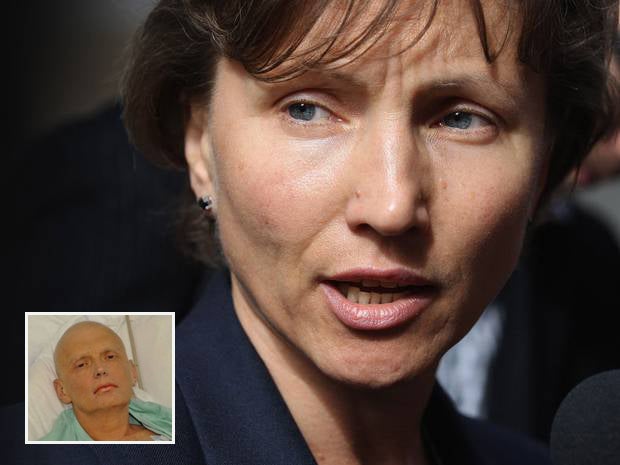Widow of poisoned spy Alexander Litvinenko says Government is trying to force her to give up attempts to uncover why Russian spy husband was murdered
Marina Litvinenko will boycott inquest unless urgent public inquiry is ordered to replace it

Your support helps us to tell the story
From reproductive rights to climate change to Big Tech, The Independent is on the ground when the story is developing. Whether it's investigating the financials of Elon Musk's pro-Trump PAC or producing our latest documentary, 'The A Word', which shines a light on the American women fighting for reproductive rights, we know how important it is to parse out the facts from the messaging.
At such a critical moment in US history, we need reporters on the ground. Your donation allows us to keep sending journalists to speak to both sides of the story.
The Independent is trusted by Americans across the entire political spectrum. And unlike many other quality news outlets, we choose not to lock Americans out of our reporting and analysis with paywalls. We believe quality journalism should be available to everyone, paid for by those who can afford it.
Your support makes all the difference.The widow of murdered Russian spy Alexander Litvinenko has suffered a "near-complete collapse of confidence" in the inquest into his death and will cease to participate unless an urgent public inquiry into the killing is ordered to replace it.
Lawyers for Marina Litvinenko, whose husband was poisoned with radioactive polonium in London in 2006, told a pre-inquest hearing at the High Court in London that the Government was leading a campaign to "coerce" her into giving up her attempts to establish why he was murdered.
Sir Robert Owen, the coroner, was told by lawyers for the Home Secretary Theresa May that his request to halt the inquest and replace it with a public inquiry, which would be able to hear secret evidence about issues including whether the killing was ordered by the Russian state, was being considered "at a very high level" of government.
In bitter exchanges arising from the ongoing the wrangle over what form of judicial process should be used to answer the questions about Mr Litvinenko's death, lawyers for Mrs Litvinenko accused the Government of doing its best to avoid establishing the truth about what took place.
The Government has succeeded in withholding some information from the public proceedings on the grounds of national security and argued that the inquest should continue - despite a statement from Sir Robert that he considers that the removal of the evidence makes it impossible for him to answer key questions such as whether there was state involvement in Mr Litvinenko's death.
Mr Litvinenko's family believe that the former Russian intelligence officer was working for MI6 at the time of this death and his murder was carried out on the orders of the Kremlin. They want to know whether the British authorities could have prevented the killing.
The 43-year-old father-of-one was poisoned with radioactive polonium-210 while drinking tea at the Millennium Hotel in London's Grosvenor Square in November 2006. Andrei Lugovoi, a former officer with the FSB, the successor to the KGB, was charged with the killing but Russia refused his extradition, plunging Anglo-Russian relations into their worst crisis since the Cold War.
Ben Emmerson QC, for Mrs Litvinenko, said: "The position of Her Majesty's Government is that it is better for the administration of justice in the country to have an inquiry that cannot get to the truth than one that can."
He added: "It is difficult to escape the sense that [Mrs Litvinenko] has been shoved, shunted and pushed around by all the forces of Her Majesty's Government in order to attempt to coerce her into abandoning her search for the truth about her husband's death."
The hearing was told that unless a public inquiry was now forthcoming from the Government, she would drop out of the inquest process and seek a judicial review of any failure to order such an inquiry.
Mr Emmerson said alleged attempts to pressure Mrs Litvinenko had reached a new level in the last fortnight when a visit by Prime Minister David Cameron to meet Russian president Vladimir Putin had coincided with a direct phone call to her from the personal assistant of Foreign Office minister David Lidington to explain the nature of the talks and that the Government was still committed to a "full investigation" into her husband's death.
The hearing was told that the direct approach was made without the knowledge or participation of Mrs Litvinenko's lawyers. Mr Emmerson, who noted that his client was still waiting after seven months for a decision on whether her legal representation will be publicly funded, said: "It is a matter of the gravest concern that this type of approach is taking place."
Neil Garnham QC, for the Home Secretary, said Mr Lidington's staff had merely placed the call out of courtesy to Mrs Litvinenko to inform her about the nature of the talks between Mr Cameron and Mr Putin ahead of media reports, adding that the Government "wholeheartedly rejects" the claims about its conduct towards Mrs Litvinenko.
When asked how long it would take for ministers to decide on whether a public inquiry will now be granted, Mr Garnham said the Government was aware of the urgency of the matter.
Join our commenting forum
Join thought-provoking conversations, follow other Independent readers and see their replies
Comments